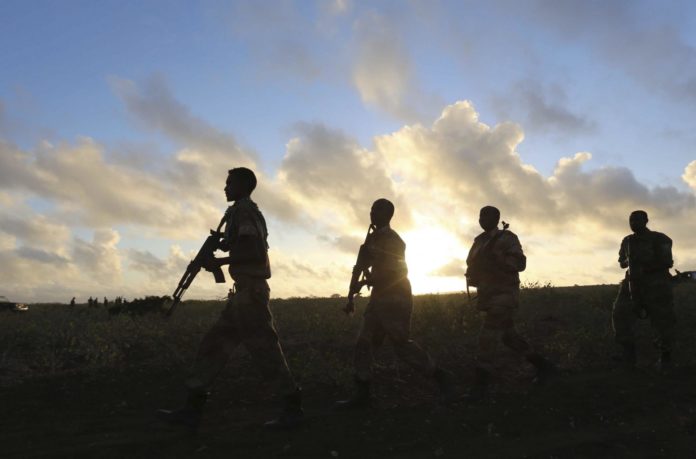Kenya says Somalia forces encroached on its territory during fighting with forces from the semi-autonomous region of Jubaland, the latest dispute between the Somali government, its federal states and neighbouring countries.
Kenya on Wednesday accused Somalia of an “unwarranted attack” on the frontier town of Mandera, during heavy fighting over the border between forces of the Federal Government of Somalia (FGS) and regional forces.
Already fraught tensions between Nairobi and Mogadishu have soared in recent days, with both sides issuing strongly worded statements accusing each other of encroaching on border territory.
Temperatures rose further after heavy fighting erupted on Monday in the Somali border town of Bulohawo between Somali federal government troops and forces from the semi-autonomous Somali region of Jubaland.
Lawmakers from the nearby Kenyan town of Mandera said on Monday the fighting was so intense it caused residents there to flee and take shelter. A Kenyan government statement condemning “violations of the country’s territorial integrity and sovereignty” appeared to indicate that Somali forces had crossed into Mandera during the battle.
The statement said that the “foreign soldiers in flagrant breach and total disregard of international laws and conventions engaged in aggressive and belligerent activities by harassing and destroying properties of Kenyan citizens living in the border town of Mandera.
“This action amounts to an unwarranted attack by foreign soldiers with the intention of provoking Kenya.”
The fighting in Somalia is the latest instance of tensions between Mogadishu and its regional governments. Jubaland authorities in August accused Mogadishu of interfering in its election and seeking to oust the incumbent president Ahmed Madobe in order to get a loyalist in power to increase federal control over the region.
Madobe, who was re-elected, is a key ally of Kenya which sees Jubaland as a buffer against Al-Shabaab militants who have staged several bloody attacks across the border. Jubaland is made up of three regions: Geddo, Middle Juba and Lower Juba, with some five districts, especially within Middle Juba, under the control of Al-Shabaab.
Kenya has been further drawn in, as it is accused of harbouring a fugitive Jubaland minister who was arrested by Mogadishu for “serious crimes” but fled from prison in January.
The fugitive minister, named Abdirashid Hassan Abdinur but also known as Abdirashid Janaan, has reportedly been hiding out in Mandera. Reports in local media stated that the fighting on Monday broke out between Somali national forces chasing the fugitive and Jubaland forces loyal to Janaan, who allegedly fled prison in Mogadishu with the help of some Somali government officials.
The Somali government says Janaan is wanted for several crimes including international human rights violations, the massacre of innocent civilians in Jubaland’s Geddo region during sectarian fighting there, and illegally escaping government custody. Janaan denies this and claims his arrest was motivated by the result of the Jubaland elections and moves by the FGS to exert further control over the region.
Amnesty International has supported Mogadishu’s call for the Kenyan government to return Janaan to Somalia, as he is “accused by the UN Somalia and Eritrea Monitoring Group of horrific crimes including killings, torture, unlawful detention and illegal renditions between 2014 and 2015.”
Seif Magango, Amnesty International’s Deputy Director for East Africa, the Horn and the Great Lakes, urged Kenya to “immediately arrest and hand him over to the Federal Government of Somalia”, adding that Janaan’s escape to Kenya had “left many victims of his alleged crimes doubtful as to whether they would ever get justice.”
Janaan is not the first official from Jubaland to seek refuge in Mandera. In November last year, Vice-President Mohamud Sayyid Adan was similarly forced to stay in the town for several weeks, after he was blocked from visiting a border town in the Geddo region by Ethiopian troops. In contrast to Kenya and its support of the Jubaland administration, Ethiopia backs the FGS.
Tensions between Kenya and Somalia are also high because of a spat over a disputed 62,000-square-mile oil and gas-rich area in the Indian Ocean that both nations claim. In February last year, Kenya recalled its ambassador in Mogadishu over revelations that Somalia had auctioned oil and gas blocks in the disputed area.
The Kenyan government dismissed a Somali foreign ministry statement last month that it was interfering in Mogadishu’s internal affairs.
Nairobi said this was “part of a growing and persistent pattern of ill intent to use Kenya as a scapegoat and a tool to justify challenges in Somalia for political reasons.”
Nairobi in its statement urged Somalia’s federal and regional governments to focus on defeating the Al-Qaeda-linked Shabaab. Observers say that the myriad feuds between the fragile government in Mogadishu and its federal states is a major obstacle to fighting the Islamists.
The recent tensions also come amid reports that Kenya is negotiating the withdrawal of its forces from the African Union Mission in Somalia (AMISOM), tasked with combating Al-Shabaab, as part of a planned transfer of security responsibilities from the AU’s peacekeeping mission to the Somali federal government.





























